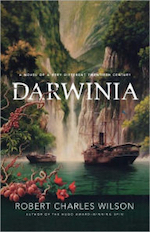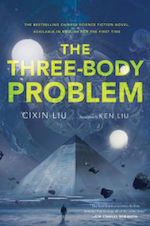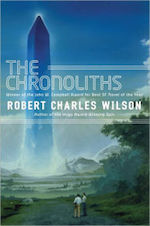If science fiction is a genre that asks “what if?”, then the authors of these five books have really outdone themselves. These are novels that go beyond the ordinary to ideas so outlandish that lesser authors might have rejected them as too insane. But these books aren’t comedies. These aren’t the kind of oddball concepts that just devolve into nonsense. Instead, these books take their audacious premises seriously, and bit by bit, explore the consequences to the characters and to humanity at large.
Darwinia, Robert Charles Wilson
 Europe disappears. It’s there one day in 1912, and gone the next. The land itself doesn’t vanish, but ships trying to arrive in port discover an untamed and unnatural wilderness where the continent once stood. Out of fuel, the ships are stranded there with no easy way back. And the millions of people who used to live there? Gone.
Europe disappears. It’s there one day in 1912, and gone the next. The land itself doesn’t vanish, but ships trying to arrive in port discover an untamed and unnatural wilderness where the continent once stood. Out of fuel, the ships are stranded there with no easy way back. And the millions of people who used to live there? Gone.
The Flicker Men, Ted Kosmatka
 There’s a common misconception about quantum physics that reality doesn’t actually exist until it is observed. It’s the stuff of quack pseudoscience, but Kosmatka uses it as his premise: If this were really true, then what would we find when we studied the phenomenon? Would all humans be able to collapse the wave? What about animals? Children? The unborn? It’s a simple premise that kicks off a whirlwind of implications and follows them to far-reaching conclusions.
There’s a common misconception about quantum physics that reality doesn’t actually exist until it is observed. It’s the stuff of quack pseudoscience, but Kosmatka uses it as his premise: If this were really true, then what would we find when we studied the phenomenon? Would all humans be able to collapse the wave? What about animals? Children? The unborn? It’s a simple premise that kicks off a whirlwind of implications and follows them to far-reaching conclusions.
The Three-Body Problem, Cixin Liu (translated by Ken Liu)
 Since this book just won the Hugo Award, nobody needs me to tell them about it! It has lots of ideas, but the one audacious one that caught my attention: A character begins to see a countdown in every photograph he takes (but not in the photos his wife takes with the same camera). A countdown to what? That’s the question.
Since this book just won the Hugo Award, nobody needs me to tell them about it! It has lots of ideas, but the one audacious one that caught my attention: A character begins to see a countdown in every photograph he takes (but not in the photos his wife takes with the same camera). A countdown to what? That’s the question.
The Chronoliths, Robert Charles Wilson
 I didn’t want to repeat an author in this list, but Wilson is practically the king of audacious premises. (His novel Spin could easily make the list as well.) In this book, a huge monolith suddenly appears in Asia commemorating the victory of an unknown leader in a battle to take place 30 years in the future. Was it sent back in time? Will it really happen? Is it a hoax? Then a second monolith appears, mapping further conquests. And a third…
I didn’t want to repeat an author in this list, but Wilson is practically the king of audacious premises. (His novel Spin could easily make the list as well.) In this book, a huge monolith suddenly appears in Asia commemorating the victory of an unknown leader in a battle to take place 30 years in the future. Was it sent back in time? Will it really happen? Is it a hoax? Then a second monolith appears, mapping further conquests. And a third…
The Time Traveler’s Wife, Audrey Niffenegger
 A man has a unique ailment: He travels in time. Uncontrollably. Frequently. Without warning, he jumps to some place and time important to him, frequently meeting his wife before he actually met her. It creates an incredible skein of mismatched cause-and-effect as he and his wife experience the major events in their relationship in a different order from each other. And incredibly, it all ties together perfectly.
A man has a unique ailment: He travels in time. Uncontrollably. Frequently. Without warning, he jumps to some place and time important to him, frequently meeting his wife before he actually met her. It creates an incredible skein of mismatched cause-and-effect as he and his wife experience the major events in their relationship in a different order from each other. And incredibly, it all ties together perfectly.
Novels like these are some of the most exciting things science fiction can offer: ideas that no other genre can match. Ideas that are not only creative, but that dig deeper, delving into how the world around us works, and what makes us human.
David Walton is the Philip K. Dick Award-winning author of the 2015 quantum physics thrillers Superposition and Supersymmetry, a pair of books with audacious ideas of their own. You can read more about his work at his website.











Darwinia would have been more audacious if they’d zapped North America and left maybe Asia or Australia. Nice idea, but the failure to really commit and give the audience a real shocking premise means it didn’t stick the landing and falls short.
Stross’s Accelerando. Deals with the process of turning humans into post-humans over hundreds of years. My brain hurt after reading it.
Y- The Last Man should have been on this list.
Not even close on the Darwinia description. Only Europe disappears, along with just a few nearby bits of other continents. Also, this happens in 1912, well before the first trans-Atlantic flight, so there are no planes looking for runways on the other side.
DARWINIA sounds similar to Fred Hoyle’s 1966 novel, OCTOBER THE FIRST IS TOO LATE. In that novel, vast areas of Earth become suddenly and mysteriously dislocated in time: Great Britain is still in the present of 1966, but Europe is in the midst of World War I in 1917, the United States is an uninhabited, primordial wilderness, Russia and China are a glassed-over, lifeless plain, and Mexico is the distant future. The physics behind this is apparently something that I think was later dubbed the “pigeon-hole theory” which I can’t begin to understand. It seemed in the novel to have something to do with using the Sun to manipulate the “information” that it somehow “records” and “stores” from sunlight striking the Earth, or at least that’s how I remember it (probably wrongly).
@1: Why would the survival of Asia or Australia be more shocking / audacious than the survival of the Americas?
I assume that the author preserved his own continent both for ease of writing, and perhaps with an eye to his readers who might find it easier to get into a story based on a history they have some familiarity with. An Asian author, knowing best the history of his own region, might reasonably have zapped everywhere but Asia – but that would not be any more audacious as a premise.
@6 It has less to do with the author and more to do with the readership. While he is a Canadian-American (or possibly an American-Canadian, I’m not sure which), he is writing primarily for the American and Canadian market, and with the United States being the primary world power in the here and now losing North America is a real shocker. It leaves his readers adrift and uncertain in the way that any other continent just doesn’t. Just removing Historical Europe so Americans can feel the thrill of being a primary historical colonial power just feels and putting Europeans at the bottom of the heap. Well, that feels kinda lazy, safe, and almost like a revenge fantasy. It isn’t doing anything really audacious with the concept, in fact for all it is a nice concept, it is taking the safe option with it. I’m sure it is a more business savvy decisions, since it will not risk offending readers in the primary market, but to be audacious I feel that it really ought to take that risk. Even the idea of it happening in the 1900s is taking a soft option with the premise. Audacious would have been doing it to America in the modern era, now that would be a book that upset the apple cart and freaked out both characters and readers.
I’d add Chaga (published as Evolution’s Shore in the US) by Ian McDonald. Aliens arrive and they are adaptive nanomachines. They land on Kilimanjaro, not on the lawn of the Whitehouse or in front of Number 10. The chaga consumes dead carbon but leaves living creatures alive. And it is spreading in all directions at 50 meters a day. (Same Ian McDonald who wrote Luna: New Moon.)
@7 Rather strange kind of revenge fantasy, given that a randomly picked American is much more likely to be descended from European colonists than from the colonised victims.
And from the viewpoint of an American in 1912, having Europe disappear is a bit like being at the edge of civilization when its center disappears. Much more disconcerting than the reverse.
I’d put Kim Stanley Robinson’s The Years of Rice and Salt on this list. Essentially it’s an alternate world history where the Black Death (IIRC) wiped out all of Europe instead of just a large chunk of the population. Then Robinson doubles down by having the story told through the eyes of a group of souls that keep meeting back in the bardo before they’re reincarnated.
@9 Well the characters there to perform for the reader, so it isn’t their reaction that matters. It is the readers that matter. Perhaps revenge is the wrong word, but certainly a power fantasy at the very least. We all know that a huge chunk of American Exceptionalism is based on showing the European powers, especially Britain, that America is better than them. That is what I mean about playing it safe. Its designed to cater more for the modern (well, 1990s) American reader without being too risky to modern American sensibilities. It is very safe in that way. Darwinia attempts to give the appearance of upsetting the world order, but in such a way that it only strengthens the perception of the current world order. I’m not saying it isn’t a nice read, but it certainly isn’t audacious in the way it handles the concept at play in it. To be audacious with the concept would be to yank the rug out of the American reader and take their home (with the implication that if it happened for real then they too would be gone) and vanish it.
@9: It’s more like the Monroe Doctrine pushed to its ultimate extreme; really not something very disturbing (for the Americans).
Ugh. AcidDC is correct about my description of Darwinia. I remembered the book with a sense of awe at the sheer audacity of the premise and Wilson’s ability to pull it off, but clearly some of the details faded with time. Here’s an update:
Europe disappears. It’s there one day in 1912, and gone the next. The land itself doesn’t vanish, but ships trying to arrive in port discover an untamed and unnatural wilderness where the continent once stood. Out of fuel, the ships are stranded there with no easy way back. And the millions of people who used to live there? Gone.
Don’t let my flawed memory stop you from giving the book a try!
As far as audacious premises go I’d always have a place for Lord of Light by Roger Zelazny. Technologically advanced humans terraform a new planet and introduce a new humanity who they keep technologically illiterate by setting themselves up as the overlording Hindu pantheon of gods. One of the original colonists falls out with the rest and sets to fight the power of their theocracy with the teachings of Buddhism. This may be contrived but it’s definitely audacious and in my opinion a fascinating read.
Personally, I thought Bios better than Darwinia.
@13 We’ve edited the post with your corrected description!
Your headline implies that the five books share a common premise. It should be, “Five Stories with Audacious Premises.”
I’d like to submit the Nantucket series by S.M Stirling, where in the middle of a freak electrical storm, the island of Nantucket and it’s inhabitants get transported 3000 years into the past. My mind is still blown a month after reading it